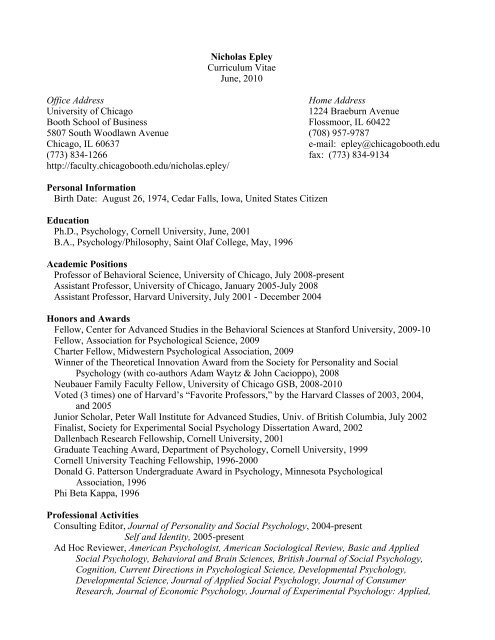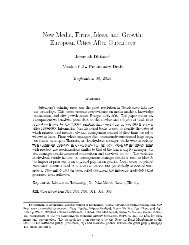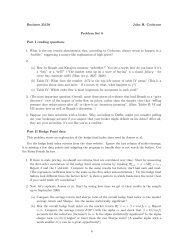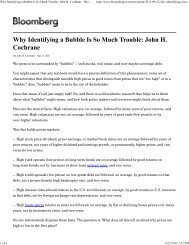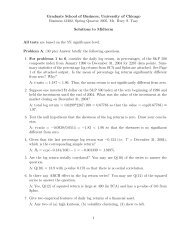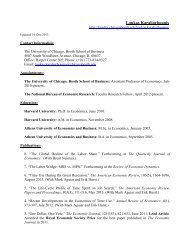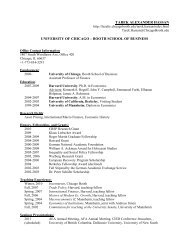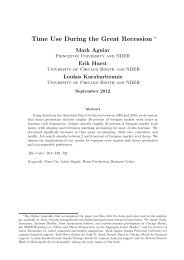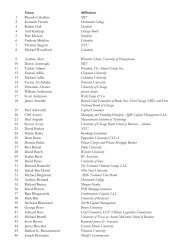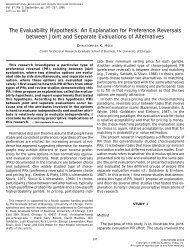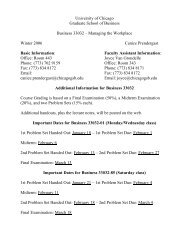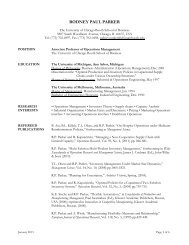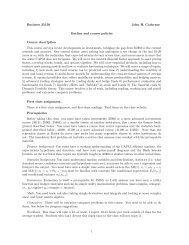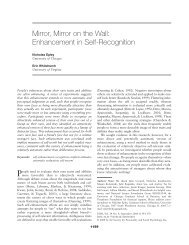Curriculum Vitae - Faculty
Curriculum Vitae - Faculty
Curriculum Vitae - Faculty
Create successful ePaper yourself
Turn your PDF publications into a flip-book with our unique Google optimized e-Paper software.
Nicholas Epley<br />
<strong>Curriculum</strong> <strong>Vitae</strong><br />
June, 2010<br />
Office Address<br />
Home Address<br />
University of Chicago<br />
1224 Braeburn Avenue<br />
Booth School of Business Flossmoor, IL 60422<br />
5807 South Woodlawn Avenue (708) 957-9787<br />
Chicago, IL 60637<br />
e-mail: epley@chicagobooth.edu<br />
(773) 834-1266 fax: (773) 834-9134<br />
http://faculty.chicagobooth.edu/nicholas.epley/<br />
Personal Information<br />
Birth Date: August 26, 1974, Cedar Falls, Iowa, United States Citizen<br />
Education<br />
Ph.D., Psychology, Cornell University, June, 2001<br />
B.A., Psychology/Philosophy, Saint Olaf College, May, 1996<br />
Academic Positions<br />
Professor of Behavioral Science, University of Chicago, July 2008-present<br />
Assistant Professor, University of Chicago, January 2005-July 2008<br />
Assistant Professor, Harvard University, July 2001 - December 2004<br />
Honors and Awards<br />
Fellow, Center for Advanced Studies in the Behavioral Sciences at Stanford University, 2009-10<br />
Fellow, Association for Psychological Science, 2009<br />
Charter Fellow, Midwestern Psychological Association, 2009<br />
Winner of the Theoretical Innovation Award from the Society for Personality and Social<br />
Psychology (with co-authors Adam Waytz & John Cacioppo), 2008<br />
Neubauer Family <strong>Faculty</strong> Fellow, University of Chicago GSB, 2008-2010<br />
Voted (3 times) one of Harvard’s “Favorite Professors,” by the Harvard Classes of 2003, 2004,<br />
and 2005<br />
Junior Scholar, Peter Wall Institute for Advanced Studies, Univ. of British Columbia, July 2002<br />
Finalist, Society for Experimental Social Psychology Dissertation Award, 2002<br />
Dallenbach Research Fellowship, Cornell University, 2001<br />
Graduate Teaching Award, Department of Psychology, Cornell University, 1999<br />
Cornell University Teaching Fellowship, 1996-2000<br />
Donald G. Patterson Undergraduate Award in Psychology, Minnesota Psychological<br />
Association, 1996<br />
Phi Beta Kappa, 1996<br />
Professional Activities<br />
Consulting Editor, Journal of Personality and Social Psychology, 2004-present<br />
Self and Identity, 2005-present<br />
Ad Hoc Reviewer, American Psychologist, American Sociological Review, Basic and Applied<br />
Social Psychology, Behavioral and Brain Sciences, British Journal of Social Psychology,<br />
Cognition, Current Directions in Psychological Science, Developmental Psychology,<br />
Developmental Science, Journal of Applied Social Psychology, Journal of Consumer<br />
Research, Journal of Economic Psychology, Journal of Experimental Psychology: Applied,
Nicholas Epley <strong>Curriculum</strong> <strong>Vitae</strong> p. 2<br />
Journal of Experimental Psychology: Learning, Memory, and Cognition, Journal of<br />
Experimental Social Psychology, Journal of Personality and Social Psychology, Medical<br />
Decision Making, Motivation and Emotion, Organizational Behavior and Human Decision<br />
Processes, Perceptual and Motor Skills, Personality and Social Psychology Bulletin,<br />
Proceedings of the National Academy of Sciences, Psychological Bulletin, Psychological<br />
Science, Science, Self & Identity, Social Cognition, Trends in Cognitive Science<br />
Panelist, National Science Foundation, Social Psychology Review Panel, 2008- present<br />
Instructor, Judgment and Decision Making (with R. Hastie), Summer Institute in Social<br />
Psychology, University of Michigan, 2005.<br />
Member, American Psychological Association, Association for Psychological Science,<br />
Midwestern Psychological Society, Society for Experimental Social Psychology, Society for<br />
Personality and Social Psychology, Society for Judgment and Decision Making<br />
Publications<br />
Waytz, A., Gray, K., Epley, N., & Wegner, D. (in press). The causes and consequences of mind<br />
perception. Trends in Cognitive Sciences.<br />
Caruso, E.M., Waytz, A., & Epley, N. (in press). The intentional mind and the hot hand:<br />
Perceiving intentions makes streaks seem likely to continue. Cognition.<br />
Epley, N. (in press). Seeing invisible minds. In Chicago Social Brain Network (Eds.), Invisible<br />
Forces and Powerful Beliefs: Gravity, Gods, and Minds.<br />
Waytz, A., Morewedge, C., Epley, N., Monteleone, G., Gao, J., & Cacioppo, J.T. (in press).<br />
Making sense by making sentient: Effectance motivation increases anthropomorphism.<br />
Journal of Personality and Social Psychology.<br />
Eyal, T., & Epley, N. (2010). How to seem telepathic: Enabling mind reading by matching selfconstrual.<br />
Psychological Science, 21, 700-705.<br />
Lin, S., Keysar, B., & Epley, N. (2010). Reflexively mindblind: Using Theory of Mind to<br />
interpret behavior requires effortful attention. Journal of Experimental Social Psychology,<br />
46, 551-556.<br />
Waytz, A., Cacioppo, J.T., & Epley, N. (2010). Who sees human? The stability and importance<br />
of individual differences in anthropomorphism. Perspectives on Psychological Science, 5,<br />
219-232.<br />
Waytz, A., Epley, N., & Cacioppo, J.T. (2010). Social cognition unbound: Insights into<br />
anthropomorphism and dehumanization. Current Directions in Psychological Science, 19,<br />
58-62.<br />
Epley, N., Converse, B.A., Delbosc, A., Monteleone, G., & Cacioppo, J. (2009). Believers’<br />
estimates of God’s beliefs are more egocentric than estimates of other people’s beliefs.<br />
Proceedings of the National Academy of Sciences, 106, 21533-21538.<br />
Epley, N., & Caruso, E. (2009). Perspective taking: Misstepping into others’ shoes. In<br />
K. Markman & W.M. Klien (Eds.), Handbook of Imagination and Mental Simulation (pp.<br />
295-309). New York: Psychology Press.
Nicholas Epley <strong>Curriculum</strong> <strong>Vitae</strong> p. 3<br />
Epley, N., & Waytz, A. (2009). Mind Perception. In S.T. Fiske, D.T. Gilbert, & G. Lindsay,<br />
(Eds.), The Handbook of Social Psychology (5 th ed., Vol I., pp. 498-541). New York: Wiley.<br />
Li, Y., & Epley, N. (2009). When the best appears to be saved for last: Serial position effects in<br />
choice. Journal of Behavioral Decision Making, 22, 378-389.<br />
Preston, J., & Epley, N. (2009). Science and God: An automatic opposition between ultimate<br />
explanations. Journal of Experimental Social Psychology, 45, 238-241.<br />
Zhang, Y., & Epley, N. (2009). Self-centered social exchange: Differential use of costs versus<br />
benefits in prosocial reciprocity. Journal of Personality and Social Psychology, 97, 796-<br />
810.<br />
Chambers, J.R., Epley, N., Savitsky, K., & Windschitl, P.D. (2008). Knowing too much: Using<br />
private knowledge to predict how one is viewed by others. Psychological Science, 19, 542-<br />
548.<br />
Converse, B.A., Lin, S., Keysar, B., & Epley, N. (2008). In the mood to get over yourself:<br />
Mood affects theory-of-mind use. Emotion, 8, 725-730.<br />
Epley, N. (2008). Solving the (real) other minds problem. Social and Personality Psychology<br />
Compass, 2, 1455-1474.<br />
Epley, N., Akalis, S., Waytz, A., & Cacioppo, J.T. (2008). Creating social connection through<br />
inferential reproduction: Loneliness and perceived agency in gadgets, gods, and<br />
greyhounds. Psychological Science, 19, 114-120.<br />
Epley, N., & Whitchurch, E. (2008). Mirror, mirror on the wall: Enhancement in selfrecognition.<br />
Personality and Social Psychology Bulletin, 34, 1159-1170.<br />
Epley, N., Waytz, A., Akalis, S., & Cacioppo, J.T. (2008). When we need a human: Motivational<br />
determinants of anthropomorphism. Social Cognition, 26, 143-155.<br />
Keysar, B., Converse, B.A., Wang, J., & Epley, N. (2008). Reciprocity is not give and take:<br />
Asymmetric reciprocity to positive and negative acts. Psychological Science, 19, 1280-<br />
1286.<br />
Alter, A., Oppenheimer, D., Epley, N., & Eyre, R. (2007). Overcoming intuition:<br />
Metacognitive difficulty activates analytical thought. Journal of Experimental Psychology:<br />
General, 136, 569-576.<br />
Epley, N., Waytz, A., & Cacioppo, J.T. (2007). On seeing human: A three-factor theory of<br />
anthropomorphism. Psychological Review, 114, 864-886.<br />
* Winner of the 2008 Theoretical Innovation Prize from the Society for Personality and<br />
Social Psychology.<br />
Morewedge, C.K., Holtzmann, L. & Epley, N. (2007). Unfixed resources: Perceived costs,<br />
consumption, and the accessible account effect. Journal of Consumer Research, 34, 459-<br />
467.
Nicholas Epley <strong>Curriculum</strong> <strong>Vitae</strong> p. 4<br />
Caruso, E.M., Epley, N., & Bazerman, M. H. (2006). The costs and benefits of undoing egocentric<br />
responsibility assessments in groups. Journal of Personality and Social Psychology, 91,<br />
857-871.<br />
* Featured as Editor’s Choice, Science (2006), 314, 1659-1661.<br />
Caruso, E.M., Epley, N., & Bazerman, M. (2006). The good, the bad, and the ugly of perspective<br />
taking in groups. In E.A. Mannix, M.A. Neale (Series Eds.) and A.E. Tenbrunsel (Vol.<br />
Ed.), Research on Managing Groups and Teams: Ethics and Groups: Vol 8. Ethics in<br />
Groups (pp. 201-224). London: Elsevier.<br />
Epley, N., Caruso, E.M., & Bazerman, M.H. (2006). When perspective taking increases taking:<br />
Reactive Egoism in social interaction. Journal of Personality and Social Psychology, 91,<br />
872-889.<br />
Epley, N., & Dunning, D. (2006). The mixed blessings of self-knowledge in behavioral prediction:<br />
Enhanced discrimination but exacerbated bias. Personality and Social Psychology Bulletin,<br />
32, 641-655.<br />
Epley, N., & Gilovich, T. (2006). The anchoring and adjustment heuristic: Why the adjustments<br />
are insufficient. Psychological Science, 17, 311-318.<br />
Epley, N., Mak, D., & Idson, L. (2006). Rebate or bonus? The impact of income framing on<br />
spending and saving. Journal of Behavioral Decision Making, 19, 213-227.<br />
Amir, O., Ariely, D., Cooke, A., Dunning, D., Epley, N., Koszegi, B., Lichtenstein, D., Mazar, N.,<br />
Mullainathan, S., Prelec, D., Shafir, E., & Silva, J. (2005). Behavioral economics,<br />
psychology, and public policy. Marketing Letters, 16, 443-454.<br />
Epley, N., & Gilovich, T. (2005). When effortful thinking influences judgmental anchoring:<br />
Differential effects of forewarning and incentives on self-generated and externally-provided<br />
anchors. Journal of Behavioral Decision Making, 18, 199-212.<br />
Epley, N., & Kruger, J. (2005). When what you type isn’t what they read: The perseverance of<br />
stereotypes and expectancies over email. Journal of Experimental Social Psychology, 41,<br />
414-422.<br />
Gilovich, T., Epley, N., & Hanko, K. (2005). Shallow thoughts about the self: The automatic<br />
components of self-assessment. In M. Alicke, D. Dunning, & J. Krueger (Eds.),<br />
The Self in Social Perception (p. 67-84). New York: Taylor & Francis Group.<br />
Kruger, J., Epley, N., Parker, J., & Ng, Z. (2005). Egocentrism over email: Can we communicate<br />
as well as we think? Journal of Personality and Social Psychology, 89, 925-936.<br />
Preston, J., & Epley, N. (2005). Explanations versus applications: The explanatory power of<br />
valuable beliefs. Psychological Science, 16, 826-832.<br />
* Featured as Editor’s Choice, Science (2005), 310, 20.<br />
Savitsky, K., Van Boven, L., Epley, N., & Wight, W. (2005). The unpacking effect in
Nicholas Epley <strong>Curriculum</strong> <strong>Vitae</strong> p. 5<br />
responsibility allocations for group tasks. Journal of Experimental Social Psychology, 41,<br />
447-457.<br />
Epley, N., & Caruso, E. (2004). Egocentric ethics. Social Justice Research, 17, 171-187.<br />
* Runner-up for Deutsch Award, given to best paper from journal in 2004.<br />
Epley, N., & Gilovich, T. (2004). Are adjustments insufficient? Personality and Social<br />
Psychology Bulletin, 30, 447-460.<br />
Epley, N., Keysar, B., Van Boven, L., & Gilovich, T. (2004). Perspective taking as egocentric<br />
anchoring and adjustment. Journal of Personality and Social Psychology, 87, 327-339.<br />
Epley, N., Morewedge, C., & Keysar, B. (2004). Perspective taking in children and adults:<br />
Equivalent egocentrism but differential correction. Journal of Experimental Social<br />
Psychology, 40, 760-768.<br />
Van Boven, L., & Epley, N. (2003). The unpacking effect in evaluative judgments. Journal of<br />
Experimental Social Psychology, 39, 263-269.<br />
Epley, N., Savitsky, K., & Gilovich, T. (2002). Empathy Neglect: Reconciling the<br />
spotlight effect and the correspondence bias. Journal of Personality and Social Psychology,<br />
83, 300-312.<br />
Epley, N., & Gilovich, T. (2001). Putting adjustment back in the anchoring and adjustment<br />
heuristic: Divergent processing of self-generated and experimenter-provided anchors.<br />
Psychological Science, 12, 391-396.<br />
* Reprinted in T. Gilovich, D. Griffin, & D. Kahneman (Eds., 2002), Heuristics and<br />
biases: The psychology of intuitive judgment (pp. 139-149). Cambridge: Cambridge<br />
University Press.<br />
Savitsky, K., Epley, N., & Gilovich, T. (2001). Do others judge us as harshly as we think?<br />
Overestimating the impact of our failures, shortcomings, and mishaps. Journal of<br />
Personality and Social Psychology, 81, 44-56.<br />
Epley, N., & Dunning, D. (2000). Feeling “Holier than thou”: Are self-serving assessments<br />
produced by errors in self or social prediction? Journal of Personality and Social<br />
Psychology, 79, 861-875.<br />
Epley, N., & Gilovich, T. (1999). Just going along: Nonconscious priming and conformity to<br />
social pressure. Journal of Experimental Social Psychology, 35, 578-589.<br />
Epley, N., Savitsky, K., & Kachelski, R.A. (1999). What every skeptic should know about<br />
subliminal persuasion. Skeptical Inquirer, 23, 40-45, 58.<br />
* Reprinted in Nier, J.A. (Ed., 2004), Taking sides: Clashing views on controversial issues<br />
in social psychology. New York: McGraw-Hill.<br />
Epley, N., & Huff, C. (1998). Suspicion, affective response, and educational benefit as a result of<br />
deception in psychology research. Personality and Social Psychology Bulletin, 24, 759-768.<br />
Commentaries, Entries, and Op-eds
Nicholas Epley <strong>Curriculum</strong> <strong>Vitae</strong> p. 6<br />
Converse, B., & Epley, N. (in press). Egocentrism. To appear in N. Salkind, & K. Rasmussen<br />
(Eds.), The Encyclopedia of Educational Psychology. Thousand Oaks, CA: Sage.<br />
Epley, N. (in press). Anchoring. In H. Pashler (Ed.), The Encyclopedia of the Mind. Thousand<br />
Oaks, CA: Sage.<br />
Epley, N., & Waytz, A. (in press). Perspective taking. In H.T. Reis & S. Sprecher (Eds.),<br />
Encyclopedia of Human Relationships. Thousand Oaks, CA: Sage.<br />
Epley, N., & Gilovich, T. (2010). Anchoring unbound. Journal of Consumer Psychology, 20, 20-<br />
24.<br />
Epley, N. (January 31, 2008). Rebate Psychology. New York Times, A27.<br />
Epley, N. (2007). Base rate fallacy. In R. Baumeister, & K. D. Vohs (Eds.),<br />
Encyclopedia of Social Psychology (Vol. 1, pp. 102-103). Thousand Oaks, CA: Sage.<br />
Gneezy, A., & Epley, N. (2007). Prospect Theory. In R. Baumeister, & K. D. Vohs<br />
(Eds.), Encyclopedia of Social Psychology (Vol. 2, 711-714). Thousand Oaks, CA: Sage.<br />
Epley, N. (2004). A tale of Tuned Decks? Anchoring as adjustment and anchoring as activation.<br />
In D.J. Koehler & N. Harvey (Eds.), The Blackwell Handbook of Judgment and<br />
Decision Making (p. 240-256). Oxford, U.K.: Blackwell Publishers.<br />
Epley, N., Van Boven, L., & Caruso, E. (2004). Balance where it really counts. Behavioral<br />
and Brain Sciences, 27, 33.<br />
Selected Conference Presentations<br />
Epley, N. (January, 2010). Making sense by making sentient. Paper presented at the Society for<br />
Personality and Social Psychology annual conference, Las Vegas, NV.<br />
Epley, N. (January, 2010). Social cognition unbound. Paper presented at the Religion and<br />
Spirituality preconference, Society for Personality and Social Psychology annual<br />
conference, Las Vegas, NV.<br />
Epley, N. (May, 2008). Creating God in one’s own image. Paper presented at the Association for<br />
Psychological Science Annual Convention, Chicago, IL.<br />
Epley, N. (February, 2008). Solving the (real) other minds problem. Paper presented at the<br />
Society for Personality and Social Psychology Conference, Albuquerque, NM.<br />
Epley, N., Waytz, A., & Cacioppo, J. (May, 2007). On seeing human. Paper presented at the<br />
Association for Psychological Science Annual Convention, Washington, D.C.<br />
Epley, N., & Converse, B. (March, 2007). Vulcan gods would have pointy ears. Paper presented at<br />
the Social Psychologists of Chicago Annual Conference, Chicago, IL.
Nicholas Epley <strong>Curriculum</strong> <strong>Vitae</strong> p. 8<br />
Epley, N., & Whitchurch, E. (January, 2006). Mirror, mirror on the wall: Perceptual selfenhancement<br />
in self- recognition. Paper presented at the Self & Identity Preconference,<br />
Palm Springs, CA.<br />
Epley, N., Caruso, E., & Bazerman, M. (January, 2006). When perspective taking increases taking:<br />
Reactive Egoism in social interaction. Paper presented at “Getting over yourself: New<br />
evidence on the boundaries and consequences of projection and perspective taking,” D.<br />
Ames (Chair). Society for Personality and Social Psychology, Palm Springs, CA.<br />
Epley, N. (May, 2005). Impression Detection: Anticipating others’ impressions of us. Invited<br />
paper presented at the Midwestern Psychological Association, Chicago, IL.<br />
Caruso, E., Epley, N., & Bazerman, M. (May, 2005). Increasing egoism by reducing egocentrism:<br />
Divergent effects of perspective taking on judgment and behavior in groups. Paper<br />
presented at the Midwestern Psychological Association, Chicago, IL.<br />
Rapien, E., & Epley, N. (May, 2005). Mirror, mirror on the wall: Perceptual self-enhancement in<br />
the recognition of one’s own attractiveness. Invited presented at the Midwestern<br />
Psychological Association, Chicago, IL.<br />
Epley, N. (March, 2005). The art and science of impression detection. Invited paper<br />
presented at the Eastern Psychological Association, Boston, MA.<br />
Epley, N., & Akalis, S. (January, 2005). Detecting versus enhancing anthropomorphic agents:<br />
The divergent effects of fear and loneliness. Paper presented in “Other minds? How<br />
people perceive non-human agents,” T. Chartrand (Chair). Society for Personality and<br />
Social Psychology, New Orleans, LA.<br />
Norwick, R., & Epley, N. (January, 2005). Experience, confidence, and the selection of heuristics in<br />
judgment. Paper presented in “Metacognition and Social Judgment.” R. Petty & Z.<br />
Tormala (Chairs). Society for Personality and Social Psychology, New Orleans, LA.<br />
Caruso, E., Epley, N., & Bazerman, M. (January, 2005). Fish and chips: When perspective taking<br />
increases taking. Poster presented at the Society for Personality and Social Psychology, New<br />
Orleans, LA.<br />
Rapien, E., & Epley, N. (January, 2005). Mirror, mirror on the wall: Self-enhancement in the<br />
recognition of one’s own attractiveness. Poster presented at the Society for Personality<br />
and Social Psychology, New Orleans, LA.<br />
Reynolds, A., & Epley, N. (January, 2005). Creating God in our own image: Misattributing<br />
incidental mood to God’s personality. Poster presented at the Society for Personality<br />
and Social Psychology, New Orleans, LA.<br />
Caruso, E. M., & Epley, N. (November, 2004). Reconciling the Hot Hand and the Gambler's Fallacy:<br />
Perceived intentionality in the prediction of repeated events. Paper presented at the<br />
Society for Judgment and Decision Making, Minneapolis, MN.<br />
Epley, N., & Gilovich, T. (October, 2004). Tales of thinking while nodding and drinking:<br />
Resurrecting the anchoring and adjustment heuristic. Paper presented in “Advances in
Nicholas Epley <strong>Curriculum</strong> <strong>Vitae</strong> p. 9<br />
the investigation and application of the anchoring and adjustment heuristic.” L. Nelson<br />
(Chair). Association for Consumer Research, Portland, OR.<br />
Epley, N., & Preston, J. (October, 2004). The explanatory utility of valuable beliefs: Science and<br />
religion. Paper presented in “On the psychology of culture: Selection mechanisms in<br />
culture and the marketplace of ideas.” C. Heath (Chair). Society for Experimental Social<br />
Psychology, Fort Worth, TX.<br />
Epley, N. (September, 2004). Outdone but not outgrown: Reconsidering differences in egocentrism<br />
between children and adults. Paper presented at the New England Social Psychological<br />
Association, Storrs, CT.<br />
Epley, N., Idson, L., & Mak, D. (July, 2004). Departing from versus returning to the status quo:<br />
Income framing, spending, and saving. Paper presented at the Society for the Advancement of<br />
Behavioral Economics, Philadelphia, PA.<br />
Epley, N. (June, 2004). Public policy implications of income framing. Paper presented at The Sixth<br />
CU-Boulder Invitational Choice Symposium, Estes, CO.<br />
Epley, N., & Caruso, E. (May, 2004). Egocentric ethics. Paper presented at “The Social Psychology<br />
of Ordinary Ethical Failures” conference, Cambridge, MA.<br />
Preston, J., & Epley, N. (May, 2004). The explanatory utility of valuable beliefs. Paper presented at<br />
the Conference on Selection in the Marketplace of Ideas and Culture, Durham, NC.<br />
Norwick, R. J. & Epley, N. (March, 2004). Differential effects of alcohol consumption on<br />
confidence. Poster presented at the American Psychology-Law Society, Scottsdale, AZ.<br />
Caruso, E. M., & Epley, N. (January, 2004). Hot hands and cool machines: Perceived intentionality<br />
in the prediction of streaks. Poster presented at the Society for Personality and Social<br />
Psychology, Austin, TX. *Winner of Student Poster Award.<br />
Preston, J., & Epley, N. (January, 2004). The explanatory utility of meaningful beliefs. Poster<br />
presented at the Society for Personality and Social Psychology, Austin, TX.<br />
Stalnaker, M., & Epley, N. (January, 2004). Convenient forgetting: Memory bias and maintenance<br />
of the planning fallacy. Poster presented at the Society for Personality and Social<br />
Psychology, Austin, TX.<br />
Epley, N., Idson, L., & Mak, D. (November, 2003). The impact of framing on spending and<br />
saving: Why people don’t spend tax rebates. Paper presented at the Society for<br />
Judgment and Decision Making, Vancouver, BC.<br />
Caruso, E., Epley, N., & Bazerman, M. (November, 2003). Leader of the packed: The costs and<br />
benefits of perspective taking in group tasks. Poster presented at the Society for<br />
Judgment and Decision Making, Vancouver, BC.
Nicholas Epley <strong>Curriculum</strong> <strong>Vitae</strong> p. 10<br />
Epley, N., Keysar, B., Van Boven, L, & Gilovich, T. (October, 2003). Understanding others by<br />
adjusting from ourselves. Paper presented in “Everything is relative! Comparison<br />
Processes in Social Judgment,” T. Mussweiler (Chair). Society for Experimental Social<br />
Psychology, Boston, MA.<br />
Kozak, M., & Epley, N. (February, 2003). Exposing the Imposter Phenomena. Poster<br />
presented at the Society for Personality and Social Psychology, Los Angeles, CA.<br />
Morewedge, C., Epley, N., & Keysar, B. (February, 2003). Egocentric reasoning in children and<br />
their parents. Poster presented at the Society for Personality and Social Psychology,<br />
Los Angeles, CA.<br />
Norwick, R., & Epley, N. (February, 2003). Experiential determinants of confidence. Poster<br />
presented at the Society for Personality and Social Psychology, Los Angeles, CA.<br />
Epley, N., & Gilovich, T. (November, 2002). Are adjustments insufficient? Paper presented<br />
at the Society for Judgment and Decision Making, Kansas City, MO.<br />
Norwick, R., & Epley, N. (November, 2002). Confidence as inference from subjective experience.<br />
Paper presented at the Society for Judgment and Decision Making, Kansas City, MO.<br />
Epley, N., & Keysar, B. (February, 2002). Perspective taking as egocentric adjustment. Paper<br />
presented in “Perspectives on Perspective Taking,” N. Epley (Chair). Society for<br />
Personality and Social Psychology, Savannah, GA.<br />
Savitsky, K., Van Boven, L, Epley, N, & Wight, W. (February, 2002). Unpacking Overclaiming.<br />
Poster presented at the Society for Personality and Social Psychology, Savannah, GA.<br />
Epley, N., & Dunning, D. (November, 2001). On the inverse relationship between confidence<br />
and calibration in self and social prediction. Paper presented at the Society for Judgment<br />
and Decision Making, Orlando, FL.<br />
Epley, N., & Kruger, J. (February, 2001). Expectancies in e-mail communication: When what<br />
you type isn’t what they read. Poster presented at the Society for Personality and<br />
Social Psychology, San Antonio, TX.<br />
Savitsky, K., Epley, N., & Gilovich, T. (February, 2001). Do others judge us as harshly as we<br />
think? Overestimating the impact of our failures, shortcomings, and mishaps. Paper<br />
presented at Society for Personality and Social Psychology, San Antonio, TX.<br />
Epley, N., & Gilovich, T. (November, 2000). The rebirth of anchoring as effortful adjustment.<br />
Paper presented at the Society for Judgment and Decision Making, New Orleans, LA.<br />
Van Boven, L, & Epley, N. (November, 2000). The unpacking effect in evaluative judgments.<br />
Paper presented at the Society for Judgment and Decision Making, New Orleans, LA.<br />
Epley, N., & Dunning, D. (June, 2000). Self and social predictions: Sometimes knowing more<br />
means predicting less. Paper presented at the American Psychological Society, Miami<br />
Beach, FL.
Nicholas Epley <strong>Curriculum</strong> <strong>Vitae</strong> p. 11<br />
Dunning, D. & Epley, N. (October, 1999). Do flattering comparisons of self with others involve<br />
misjudgments of the self or mispredictions of others? Paper presented in “Mispredicting<br />
the Self,” D. Dunning (Chair). Society for Experimental Social Psychology, St. Louis, MO.<br />
Gilovich, T., Epley, N., & Savitsky, K., (October, 1999). Is it as bad as we fear? Overestimating<br />
the impact of our failures, shortcomings, & mishaps. Paper presented in “Mispredicting the<br />
Self,” D. Dunning (Chair). Society for Experimental Social Psychology, St. Louis, MO.<br />
Epley, N., Savitsky, K., & Gilovich, T. (June, 1999). Empathic Ignorance: The consequences<br />
of failing to appreciate others’ empathy. Paper presented at the American Psychological<br />
Society, Denver, CO.<br />
Kruger, J., Epley, N., & Gilovich, T. (June, 1999). Egocentrism over e-mail. Poster presented at<br />
the American Psychological Society, Denver, CO.<br />
Epley, N. (April, 1998). Increasing the influence: Automaticity in conformity behavior. Paper<br />
presented at the Cognitive Studies Research Forum, Ithaca, NY.<br />
Epley, N., Savitsky, K., & Gilovich, T. (April, 1998). "Is it really as bad as we think?<br />
Overestimating the impact of our social blunders." Invited paper presented at Empire State<br />
Social Psychology conference, Blue Mountain Lake, NY.<br />
Van Boven, L., & Epley, N. (April, 1998). When the whole is less than the sum of its parts;<br />
Implications of Support Theory for affective forecasting and judgments of blame. Paper<br />
presented at Empire State Social Psychology conference, Blue Mountain Lake, NY.<br />
Epley, N., & Dunning, D. (February, 1998). Errors in self or social psychology?; Investigating<br />
people’s predictions of their own and others’ behaviors. Paper presented at the Eastern<br />
Psychological Association, Boston, MA.<br />
Savitsky, K., Epley, N., & Gilovich, T. (February, 1998). Overestimating the impact: Are our<br />
social blunders judged as harshly as we think? Poster presented at the Eastern<br />
Psychological Association, Boston, MA.<br />
Epley, N., & Gilovich, T. (May, 1997). Direct, non-conscious priming effects on conformity<br />
behavior. Poster presented at the American Psychological Society, Washington, DC.<br />
Invited Presentations<br />
Harvard University, Department of Psychology, 2000<br />
Michigan State University, Department of Psychology, 2000<br />
Ohio University, Department of Psychology, 2000<br />
Princeton University, Department of Psychology, 2000<br />
Queens University, Department of Psychology, 2000<br />
University of Wisconsin-Madison, Department of Psychology, 2000<br />
Washington University, St. Louis, Department of Psychology, 2000<br />
Harvard University, Department of Psychology, 2001<br />
Harvard University, Program on Negotiations, 2001<br />
Harvard University, Political Psychology and Behavior Research Seminar, 2001
Nicholas Epley <strong>Curriculum</strong> <strong>Vitae</strong> p. 12<br />
Northwestern University, Department of Psychology, 2001<br />
State University of New York—Buffalo, Department of Psychology, 2001<br />
University of Chicago, Graduate School of Business. 2001<br />
University of Massachusetts, Amherst, Department of Psychology, 2001<br />
Cedar Rapids Prairie High School, Graduation Commencement Speaker, 2002<br />
Duke University, Fuqua School of Business, 2002<br />
Greater Boston Undergraduate Psychology Conference, Keynote Address, 2002<br />
Massachusetts Institute of Technology, Sloan School of Business, 2002<br />
Northeastern University, Department of Psychology, 2002<br />
University of British Columbia, Peter Wall Institute for Advanced Studies, 2002<br />
University of Chicago, Graduate School of Business, 2002<br />
University of Connecticut, Department of Psychology, 2002<br />
University of Iowa, Department of Psychology, 2002<br />
Yale University, Department of Psychology, 2002<br />
Dartmouth University, Department of Brain and Behavioral Sciences, 2003<br />
University of Illinois, Department of Psychology, 2003<br />
University of Virginia, Department of Psychology, 2003<br />
University of Pennsylvania, Wharton School of Business, 2004<br />
Ohio State University, Department of Psychology, 2004<br />
Harvard University, Department of Psychology, 2004<br />
Columbia University, Graduate School of Business, 2004<br />
University of Chicago, Department of Psychology, 2005<br />
University of Chicago, Graduate School of Business, 2005<br />
Indiana University, Department of Psychology, 2005<br />
University of Illinois at Chicago, Department of Psychology, 2006<br />
Harvard University, Business School, 2006<br />
University of Chicago, Divinity School, 2006<br />
Cornell University, Behavioral Economics and Decision Research Center, 2006<br />
Carnegie Mellon University, Social and Decision Sciences, 2007<br />
University of California-Berkeley, Haas School of Business, 2008<br />
Stanford University, Department of Psychology, 2009<br />
University of California-Los Angeles, 2009<br />
Stanford University, Graduate School of Business, 2009<br />
Stanford University, Department of Psychology, Social Psychology Area, 2009<br />
Center for Advanced Study in the Behavioral Sciences at Stanford University, 2009<br />
Grants and Research Funding<br />
External:<br />
National Science Foundation SES 0241544 (4/01/2003-3/31/2007). $199,871.<br />
“Collaborative Research: The anchoring and adjustment heuristic in everyday life.”<br />
Principal Investigator.<br />
The Templeton Foundation #12344 (3/15/2007-3/14/2010). $2,202,204.<br />
“Understanding human nature to harness human potential: The human nature/human<br />
potential program.” Senior Scientist.<br />
Internal (Harvard University):<br />
Milton Fund (2003-2004). $34,159. “Perspective Taking as Egocentric Anchoring and<br />
Adjustment.”
Nicholas Epley <strong>Curriculum</strong> <strong>Vitae</strong> p. 13<br />
Clark/Cooke Fund (2002-2005), Harvard University. $5,920. “Intrapersonal Contrasts in<br />
Interpersonal Perception.”


